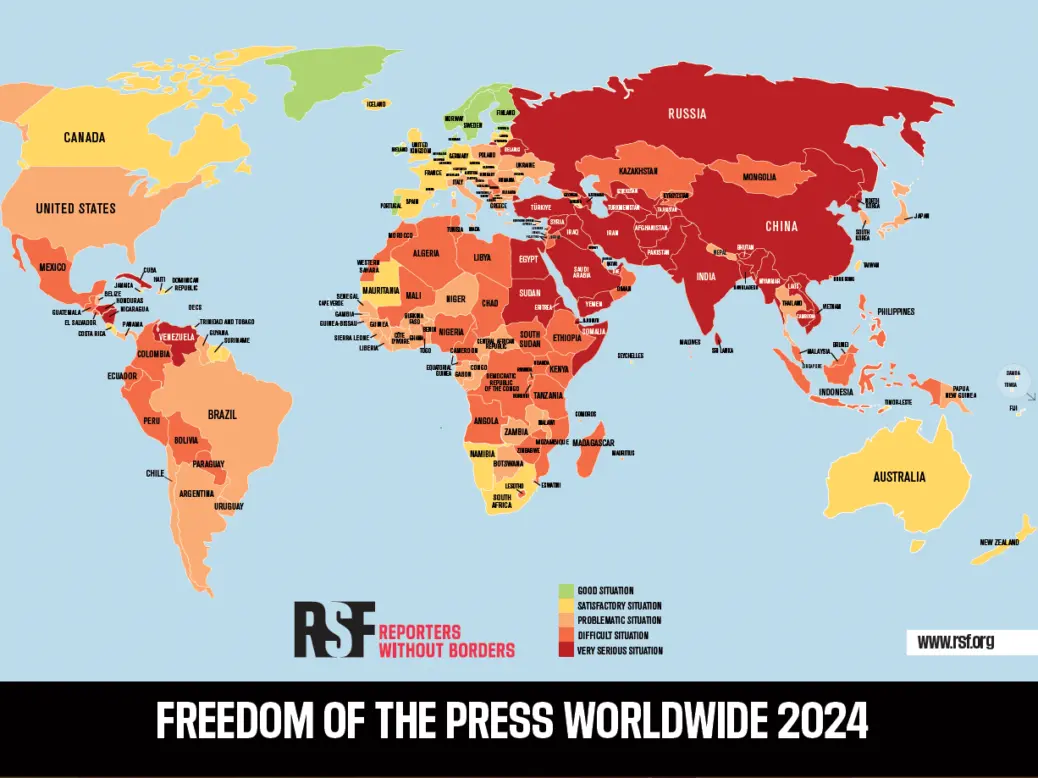RSF Press Freedom Index 2024: UK and US scores hit by widespread job cuts
Worldwide, RSF said political attacks on journalists hav
The Reporters Without Borders (RSF) Press Freedom Index scores for both the UK and US have dropped, driven in part by financial difficulties resulting in widespread job cuts.
The UK’s score was largely flat compared to 2023, but it suffered a five-point drop to 69.4 out of 100 in its economic indicator, which moved from a “satisfactory” to a “problematic” classification. The UK’s overall classification remained “satisfactory”.
The UK improved by three places in the 2024 ranking to 23rd of 180 countries, despite losing one point, because other countries’ scores declined more steeply. This put the UK just behind Samoa and ahead of Jamaica.
RSF UK bureau director Fiona O’Brien told Press Gazette: “While overall, the ability of journalists to work freely in the UK remains stable, it is worrying to see the economic indicator slip into the ‘problematic’ zone, reflecting a challenging economic environment.
“This has been a tough year for the industry in the UK, with mass redundancies at major employers and a number of smaller or regional platforms forced to close.
“Such extensive cuts, combined with a challenging economic climate more broadly, have a clear impact on the ability of newsrooms to continue providing a quality service, as well as on the well-being of the journalists involved.”
Similarly the US dropped almost nine points on its economic indicator to 61 — the largest decline in any of its individual scores.
The US fell ten spots on the ranking to 55th, with its overall press freedom situation classed as “problematic”.
RSF said the decline was “at least in part fuelled by open antagonism from political officials, including calls to jail journalists” and police actions against journalists and newsrooms in the past year.
O’Brien added that in the US, “anti-media policies are gaining in prevalence, especially at the local level, and there have been significant layoffs and media closures, impacting the economic context score.
“The safety ranking has declined sharply in the last two years, reflecting the killings of two journalists – Jeff German in 2022 and Dylan Lyons in 2023 – and a number of acts of violence against journalists and arrests. Trust in media also continues to decline, a trend encouraged by political actors seeking to vilify the press”.
Across the world however it is political pressure on journalism that has increased the most, according to RSF, with the average political indicator score among all countries declining 7.6 points.
Only a quarter of countries’ press freedom now deemed ‘satisfactory’ by RSF
The overall picture was one of deterioration, with the percentage of countries classed as overall “good” or “satisfactory” for press freedom declining from 29% in 2023 to 25% in 2024.
The number of countries in the lowest category, “very serious”, rose from 31 to 36, representing half the global population.
Enough countries saw large declines that several others rose up the charts despite drops in their scores. They include Russia, which rose two spots to 162 despite its ongoing imprisonment of journalists, and India, which rose two spots to 159 despite losing points for “adopting more draconian laws”.
Hong Kong too rose five places despite losing points “due to an increase in the persecution of journalists under the national security law imposed by Beijing in 2020”.
In Europe Germany jumped 11 places into the top ten after “a decline in attacks on journalists by far-right groups”.
Ireland meanwhile dropped from second place to eighth, which RSF blamed on politicians who had “subjected media outlets to judicial intimidation”.
Israel drops down press freedom charts
Scores in more than half of North and South American countries fell, which RSF said was “particularly due to the fall in the political indicator”. Canada, at 14, is the highest-ranked nation in the Americas, followed by Jamaica (24), Trinidad and Tobago (25) and Costa Rica (26).
Israel has dropped to 101st and so lost its top spot in the Middle East and Maghreb region to Qatar, which ranks 84th.
RSF said that since 7 October Israel “has been trying to suppress the reporting coming out of the besieged enclave [Gaza] while disinformation infiltrates its own media ecosystem”, resulting in its overall press freedom situation being classed down from “problematic” to “difficult”.
Palestine ranked lower still, at 157, in significant part because of the large number of journalists killed in Gaza during Israel’s siege of the strip.
The only country in the region that saw its political score improve was Morocco, which RSF was “due to the absence of new arrests. The scale of the persecution of journalists, especially judicial persecution, continues unchanged in Morocco.”
Press Freedom Reporters Without Borderse stepped up.



